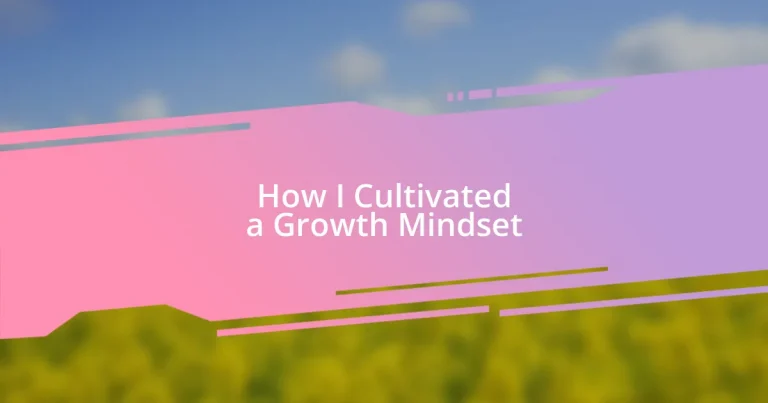Key takeaways:
- A growth mindset involves embracing challenges, learning from failures, and viewing feedback as an opportunity for growth.
- Setting achievable personal goals with specific, measurable, realistic, and time-bound criteria can transform aspirations into actionable steps.
- Developing resilience through everyday challenges and supportive relationships is crucial for personal growth and coping with setbacks.
- Celebrating small wins and tracking progress fosters motivation and reinforces the importance of every step in the growth journey.
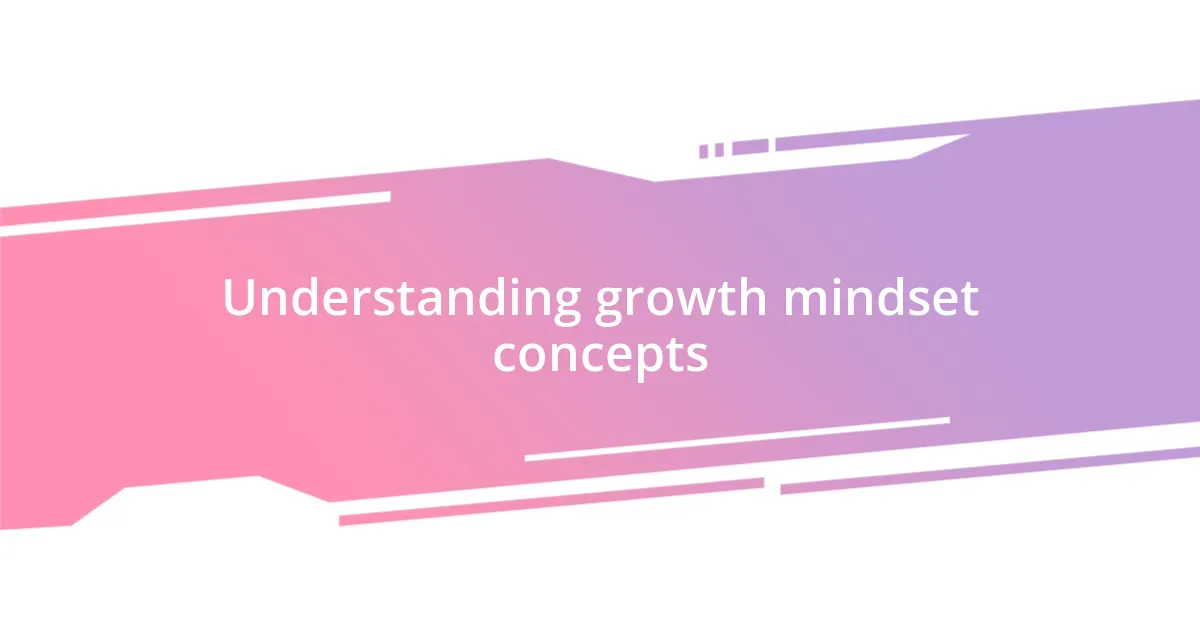
Understanding growth mindset concepts
A growth mindset is fundamentally the belief that abilities and intelligence can be developed. I remember a time when I struggled with public speaking; I often felt paralyzed by fear. But instead of avoiding it, I began to challenge myself, asking, “What if I could improve?” This simple question opened up a world of possibilities.
Embracing challenges is a hallmark of a growth mindset. There were moments in my career where taking on difficult projects felt daunting. I often wondered why I was doing this to myself, but I soon realized that each struggle taught me something valuable. With each challenge, I built resilience and learned to appreciate the journey rather than just the destination.
Another key concept is the understanding that failure isn’t a dead end; it’s a stepping stone. I recall a time when a project I poured my heart into collapsed miserably. Instead of allowing myself to wallow in defeat, I reflected on what went wrong. How could I grow from this experience? That mindset shift transformed my perspective and fueled my desire to keep trying, no matter the setbacks.
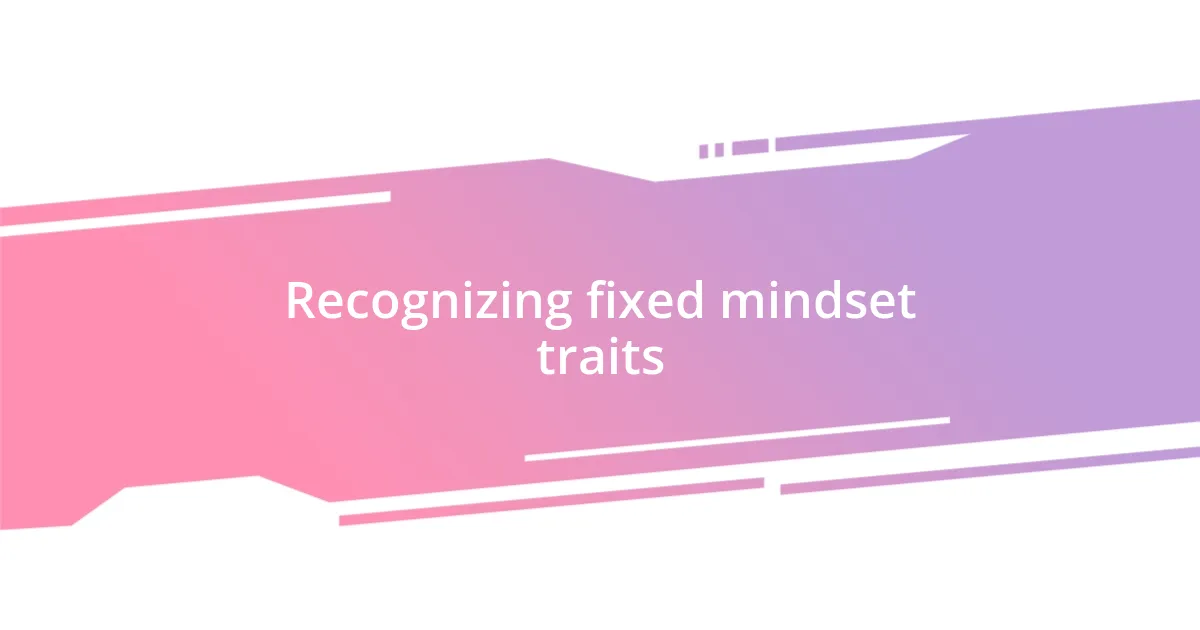
Recognizing fixed mindset traits
Recognizing the traits of a fixed mindset is the first step in transforming into a growth mindset. I remember often feeling defeated by challenges, believing that my abilities were set in stone. There was a time when I avoided taking on new tasks, convincing myself that I wasn’t capable enough. It wasn’t until I acknowledged these patterns that I realized how limiting they were.
One common trait I identified in myself was the fear of criticism. I would take feedback very personally, feeling as if it defined my entire worth. When a colleague pointed out flaws in my work, my immediate reaction was defensiveness. Over time, I learned that constructive criticism can be a powerful tool for growth. Realizing that the feedback was about the work, not me as a person, was liberating and life-changing.
Additionally, I noticed a tendency to give up easily when faced with obstacles. This trait was deeply rooted in my past experiences. Whenever I encountered difficulties, I would often throw in the towel, convinced that I just wasn’t cut out for it. However, embracing the notion that persistence is key helped me push through tough times. I began to view challenges as opportunities rather than threats, slowly claiming my narrative of success.
| Fixed Mindset Traits | Growth Mindset Traits |
|---|---|
| Avoids challenges | Embraces challenges |
| Takes feedback personally | Sees feedback as a chance to grow |
| Gives up easily | Persistently confronts obstacles |
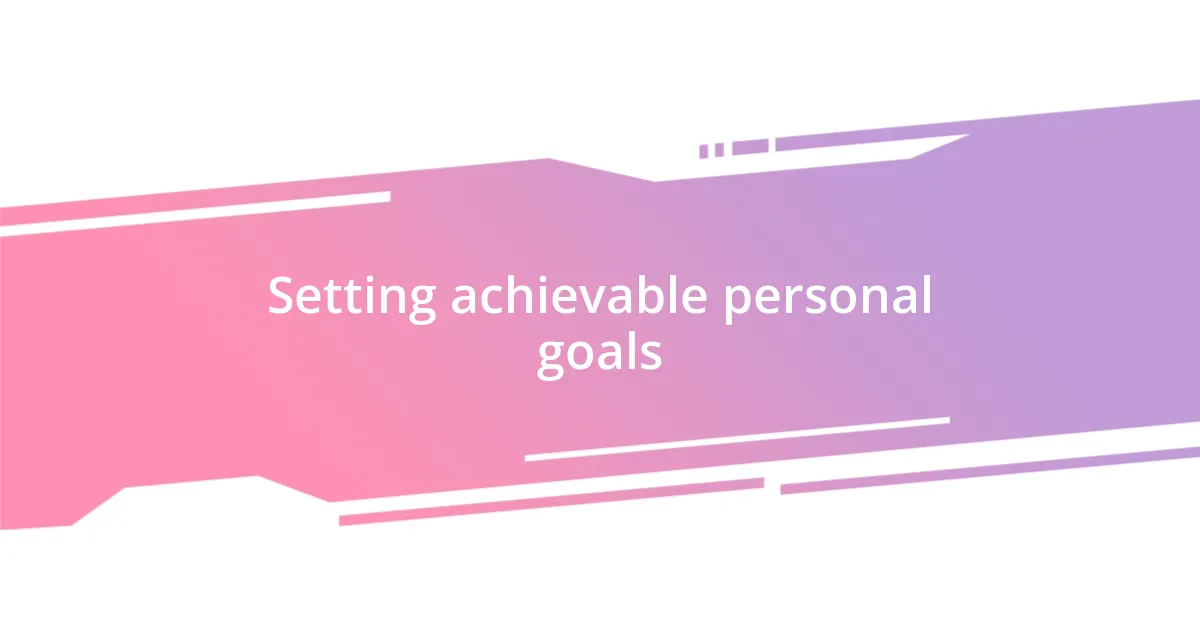
Setting achievable personal goals
Setting personal goals has always been a cornerstone of my journey toward cultivating a growth mindset. I remember setting a seemingly simple goal of reading one book each month. Initially, this felt overwhelming—I had a busy schedule and didn’t think I would find the time. However, breaking it down into smaller, manageable steps, like reading just ten pages a day, made it achievable. That small commitment turned into a transformative habit, and I found joy in the process rather than seeing it as just a task on my to-do list.
To ensure your goals are achievable, here are some practical tips that I’ve found helpful:
- Be Specific: Instead of “I want to get fit,” aim for “I will walk for 30 minutes three times a week.”
- Set Measurable Goals: Having clear criteria for success helps you stay motivated.
- Keep it Realistic: Choose goals that align with your current lifestyle; it’s about progress, not perfection.
- Time-Bound: Setting a deadline creates urgency. I often use calendar reminders to keep myself on track.
- Reflect and Adjust: At the end of each month, I review my goals. If something isn’t working, I adjust it rather than feeling like I’ve failed.
These insights have helped me transform my initial aspirations into actionable steps, keeping me focused on growth rather than frustration.
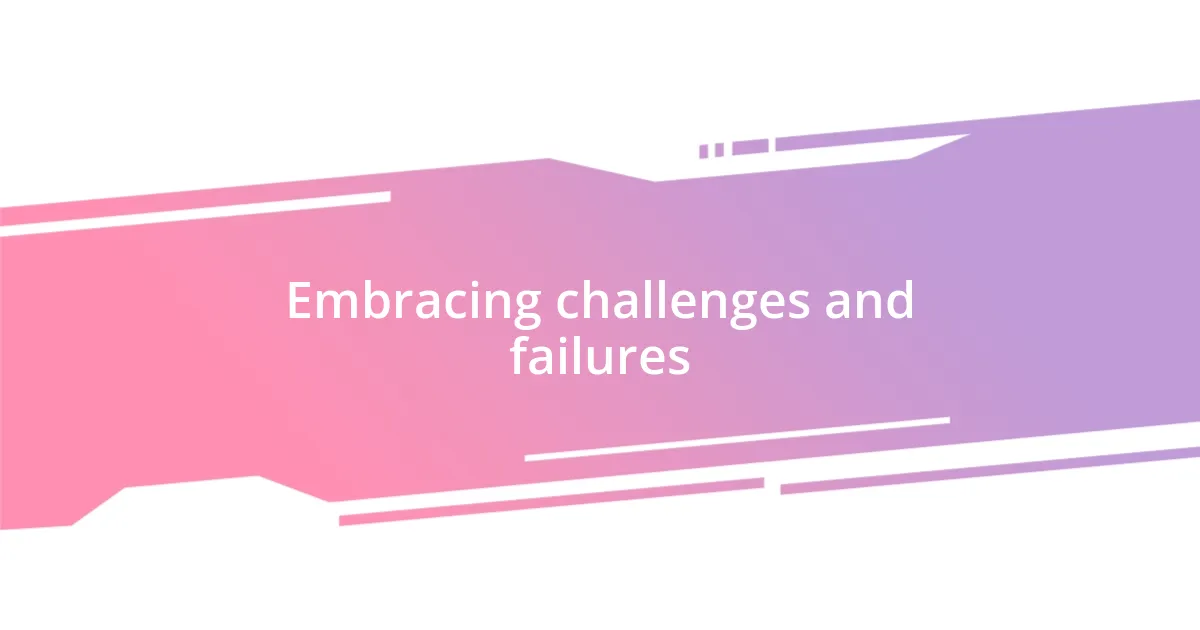
Embracing challenges and failures
Embracing challenges and failures has been one of the most profound aspects of my growth journey. I recall a moment when I decided to take on a project that seemed far beyond my skills. At first, it felt like stepping into an abyss. But when I faced the setbacks, as daunting as they were, I began to see the beauty in struggling through them. Each obstacle was not just a wall, but a window—an opportunity to learn something new about myself and my capabilities.
There was a particular time when I failed miserably at a presentation that I had prepared for weeks. I could feel my heart sink as the feedback came pouring in. Initially, I was crushed and berated myself for not meeting expectations. However, reflecting on that experience, I understood that failure is often more telling than success. It revealed gaps in my understanding and communication skills that I had overlooked. Did I want to continue feeling defeated? Absolutely not. So, I took that harsh feedback and transformed it into a learning lesson that propelled my development.
It’s fascinating how challenges can reshape our outlook. Each setback I encountered was a reminder that mastery is a journey, not a destination. I often ask myself, “What can this teach me?” By shifting my perspective from seeing failures as setbacks to viewing them as stepping stones, I’ve empowered myself to tackle even bigger challenges. This shift has made every attempt feel like an adventure rather than a trial, which not only keeps my motivation high but also nurtures my resilience.
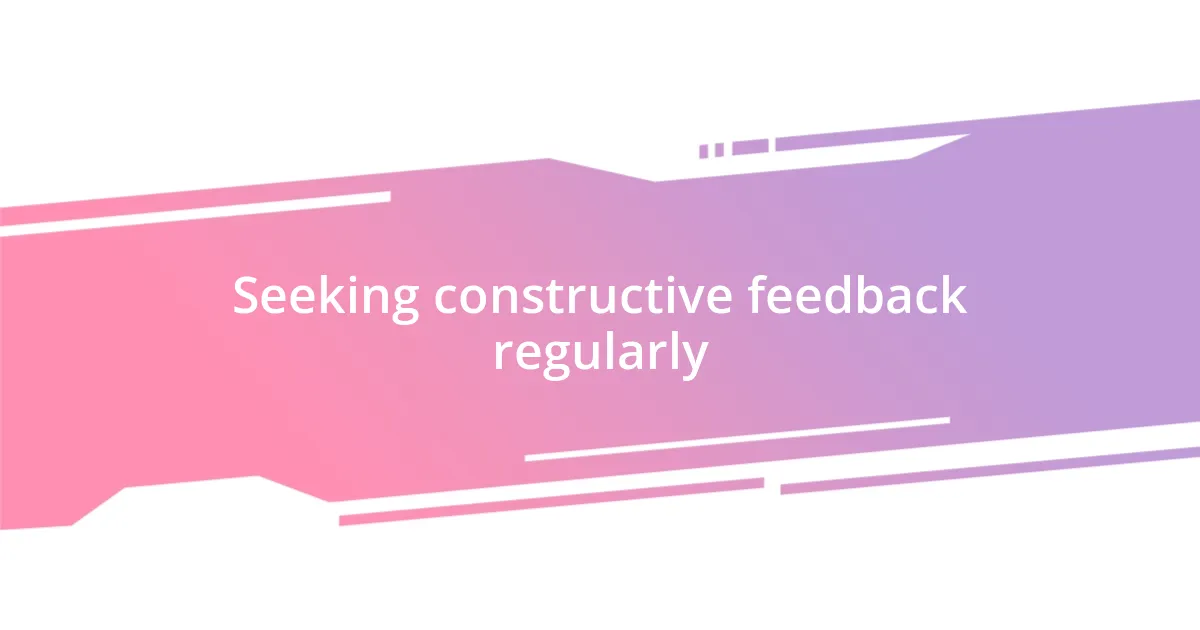
Seeking constructive feedback regularly
Seeking constructive feedback regularly has been a game changer in my growth mindset journey. I used to shy away from criticism, thinking, “If they don’t say anything, it means I’m doing fine.” But I soon realized that input from others offers invaluable perspectives I often can’t see myself. I remember working on a project and sharing it with a close colleague. Their insights opened my eyes to flaws I hadn’t considered, and instead of feeling discouraged, I felt empowered to improve.
The more I asked for feedback, the easier it became to handle it. At first, I felt vulnerable putting my work under the microscope. It felt like standing naked in front of a crowd! But I learned that vulnerability is a pathway to growth. One memorable instance occurred when I submitted an article for peer review. The critiques were tough, but each one was rooted in a desire to help me become a better writer. Did I absorb every piece of feedback without a twinge of defensiveness? Not initially. However, I gradually learned to view each comment as a brick in the wall of my professional development, helping me build something solid and appealing.
In my experience, seeking feedback regularly not only sharpens my skills but also fosters connections with others. It can lead to deep conversations that feel like mini mentorship sessions. When I ask someone for their thoughts, I’m inviting them into my process; it cultivates trust and opens doors for collaboration. It’s a fantastic way to realize, “Hey, I’m not alone in this!” So, have you ever thought about how much help could be waiting on the other side of a simple question? I know I have, and that inquiry has often led me to unexpected insights that enrich my journey.
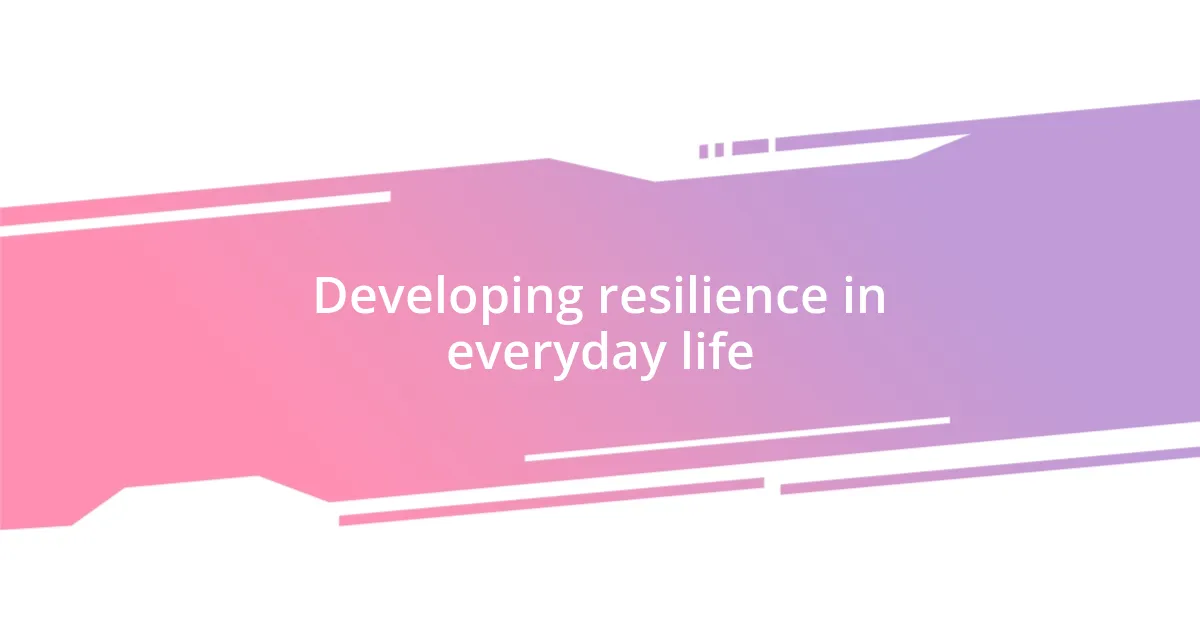
Developing resilience in everyday life
When it comes to developing resilience in everyday life, I’ve discovered that creating a routine around small, consistent challenges is invaluable. For instance, I made a habit of setting aside time each day to learn something new, whether it was a language app or a cooking technique. I vividly remember the first time I attempted a complex recipe. The end result was a culinary disaster, yet instead of giving up, I found joy in the process. This wasn’t just about cooking; it became a lesson in perseverance. How often do we shy away from trying something again after a setback? I’ve found that embracing these mini-challenges builds resilience, turning each failure into fuel for future attempts.
Another pivotal experience for me was during a particularly stressful period at work. I encountered a project that seemed insurmountable, filled with unexpected hurdles. I decided to embrace the chaos instead of succumbing to frustration. I started jotting down my feelings, allowing myself to process the stress rather than bottling it up. It was eye-opening! I began to see these emotional responses as stepping stones rather than stumbling blocks. Do we truly allow ourselves to feel these emotions, or do we push them aside? In leaning into my feelings, I felt more equipped to tackle the project’s demands, which ultimately made me more resilient in high-pressure situations.
Resilience also flourishes within supportive relationships, and I’ve learned to lean on my friends during tough times. There was a moment when I experienced significant personal loss, and reaching out for support felt daunting. Yet, when I opened up about my struggles, my friends stepped in, offering both emotional and practical support. It was then I realized resilience isn’t just an individual trait; it thrives in community. How often do we underestimate the power of connection? I now actively foster these relationships, enhancing my resilience toolkit and enabling me to bounce back stronger from life’s challenges, knowing I’m never truly alone.
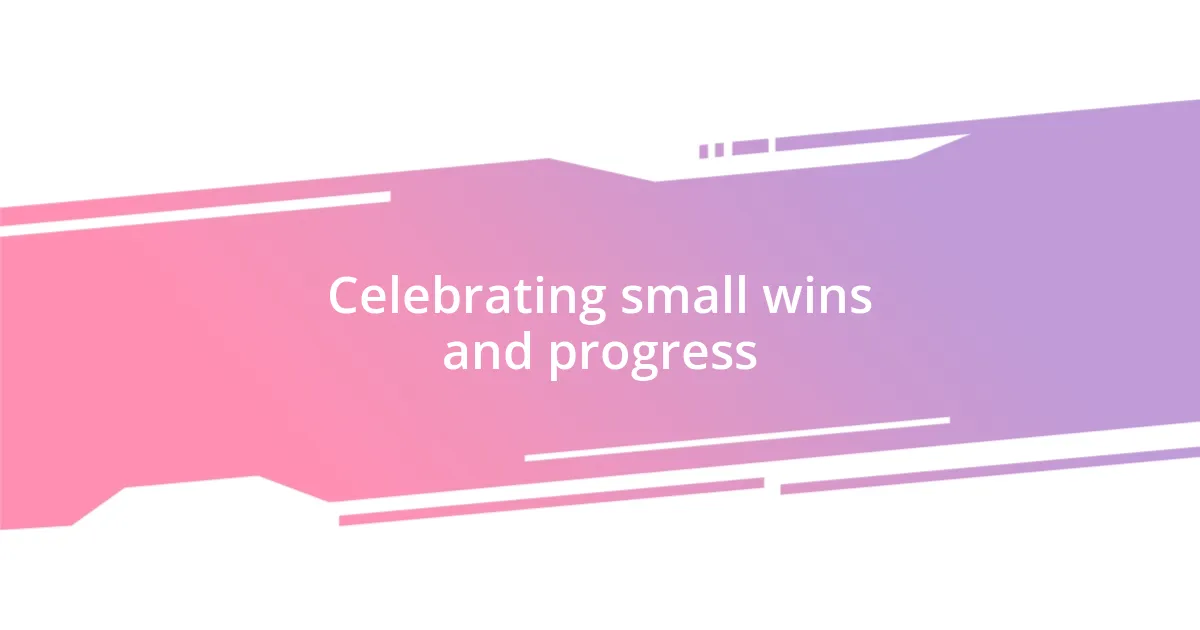
Celebrating small wins and progress
Celebrating small wins has been a vital part of my journey toward a growth mindset. I remember a time when I nailed a presentation that I had spent weeks preparing for. Instead of just moving on to the next task, I treated myself to a nice dinner. It may seem trivial, but that little celebration ignited a spark of motivation within me. Isn’t it funny how our victories, no matter how small, can light up our path forward?
Tracking progress can also amplify these celebrations. I started jotting down my accomplishments in a journal, from successfully completing a workout to finishing a challenging book. Each entry became a reminder of my journey, challenging me to appreciate the steps along the way. Sometimes, I even revisit those entries when I’m feeling stuck, and it lifts my spirits. Have you ever taken the time to reflect on how far you’ve come? It’s invigorating and reminds us that every effort matters.
I’ve also noticed that sharing my wins with others enhances the joy of celebration. Recently, I posted about reaching a personal goal on social media. The flood of supportive comments not only made my day but also fostered a sense of belonging. It reinforces the idea that accomplishments, no matter their size, deserve recognition. Isn’t it amazing how sharing your journey can create a ripple effect of encouragement? This can inspire others to celebrate their wins too, contributing to a culture of growth where everyone feels empowered!












